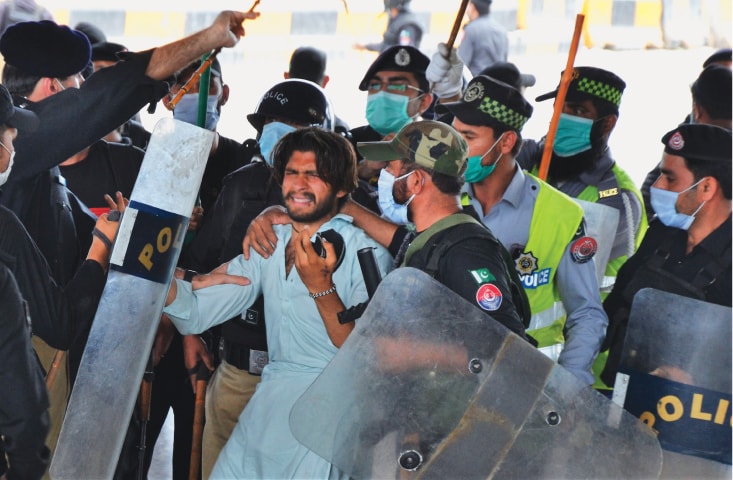The poor implementation of the law in Pakistan has emerged as a significant concern for both the citizens and the government. Despite a wide range of laws, rules, and regulations, their effective enforcement and enforcement remains an ongoing challenge. This article is intended to delve into different aspects of the issue and highlight the judgments, laws, rules, and violations that contribute to this situation. Addressing these concerns head-on will help us better understand the complexities involved and work towards meaningful solutions.
The judiciary is the pillar of a democratic society, enforcing the law and protecting the rights of citizens. However, Pakistan’s judicial system faces numerous challenges that hinder its ability to achieve prompt and impartial justice. Overburdened courts, large backlogs, and procedural delays often lead to a lack of public confidence. In addition, allegations of corruption against some judicial officials have further undermined public confidence in the judicial system.
Another factor in poor law enforcement in Pakistan is that the law is outdated. Many laws have not kept up with the development of society, making them ineffective and meaningless. Moreover, inconsistent changes to existing laws often cause confusion and leave room for abuse and violation. This hinders the effective functioning of the legal framework and undermines the credibility of the judicial system.
The rule of law is essential to a just and equal society. Unfortunately, political interference in legal affairs is common in Pakistan. Political pressure and influence often undermine the impartiality of law enforcement and the judicial process. This interference not only jeopardizes the integrity of the justice system, but also perpetuates a culture of impunity that allows those in power to escape legal consequences.
Pakistan’s criminal justice system faces a variety of challenges that hinder its effectiveness. There have been reports of police misconduct, including torture, illegal detention, and deaths in custody, undermining public confidence. In addition, deficiencies in the investigative process, lack of forensic technology, and intimidation of witnesses further impede the prosecution of criminals. These institutional deficiencies fuel public insecurity and hinder law enforcement.
Respect and protection of human rights are fundamental aspects of a democratic society. However, human rights law violations continue to occur in Pakistan due to poor enforcement of the legal framework. Incidents of enforced disappearances, extrajudicial killings, restrictions on freedom of expression and gender-based violence remain widespread concerns. Such violations not only undermine the principles of justice but also undermine the country’s standing on the international stage. Requiring the need for reform and accountability.

Strengthening Judicial System Efficiency and Increased Funding: Allocating adequate financial resources to the judiciary will help improve infrastructure, technology integration, and training programs. This will enable courts to handle cases more efficiently, reducing delays and backlogs.
Modernization of Court Processes: Embracing technology and digitalization can streamline court processes, facilitating quicker and more transparent proceedings. Implementing case management systems, online filing, and e-discovery tools can significantly enhance the efficiency of the judicial system.
Specialized Courts: Establishing specialized courts to handle specific types of cases, such as commercial disputes, family matters, or cybercrime, can expedite the resolution of cases and ensure Proper Solutions.
Do legislative Reforms and Policy Development, In order to prevent poor implementation of law, it is essential to review and update existing legislation and policies. Conducting a comprehensive review of existing laws, rules, and regulations is necessary to identify outdated or ineffective provisions. This review should include consultation with legal experts, stakeholders, and the public to ensure inclusivity and transparency. Any amendments made to legislation should be consistent, clear, and in line with the evolving needs of society. Ensuring that laws remain relevant and adaptable to changing circumstances will contribute to their effective implementation. Engaging relevant stakeholders, such as legal professionals, academics, civil society organizations, and the public, in the lawmaking process can lead to more informed and inclusive legislation. Their insights and perspectives can help identify potential loopholes or areas of improvement.
Effective law enforcement is vital for the proper implementation of law. Strengthening law enforcement agencies can contribute significantly to combating poor implementation. Equipping law enforcement agencies with modern technology, such as forensic tools, surveillance systems, and communication networks, can enhance their effectiveness in crime prevention, investigation, and apprehension of offenders. Building positive relationships between law enforcement agencies and the community is essential for effective implementation. Promoting community policing initiatives, establishing grievance mechanisms, and fostering trust between citizens and law enforcement officials can lead to more cooperative efforts in enforcing the law.
Written and Critically Analyzed by:

